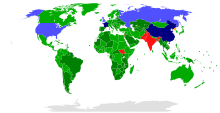Nuclear Non-Proliferation Treaty

The Nuclear Non-Proliferation Treaty (or NNPT) is a treaty that was made to stop nuclear weapons from being built. It was written in 1968, entered into force in 1970, and 190 countries have signed it since then. Only four nations have not signed it: India, Israel, Pakistan South Sudan. North Korea withdrew in 2003.
Terms
[change | change source]The treaty says that only five countries are allowed to have nuclear weapons. These are called nuclear weapons states. The five nuclear weapons states are China, France, the United Kingdom, the United States, and Russia. All five of these nations have all signed the treaty. They are not supposed to help any other nation build nuclear weapons. All other nations who sign the Nuclear Non-Proliferation Treaty promise not to build more nuclear weapons for themselves or others.
The treaty also says that every nation is able to build nuclear power plants and have nuclear technology. However, nations who sign the treaty, but are not nuclear weapons states, promise to not use their nuclear power plants to make nuclear weapons.
The main corporations that made this treaty happen were the United Nations and the IAEA.
